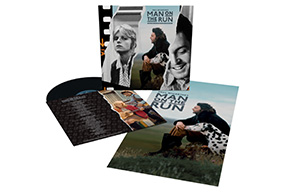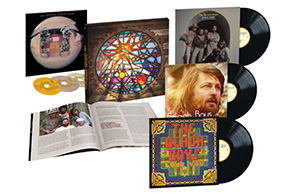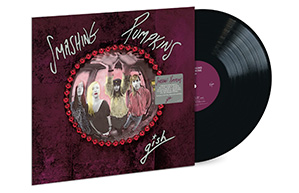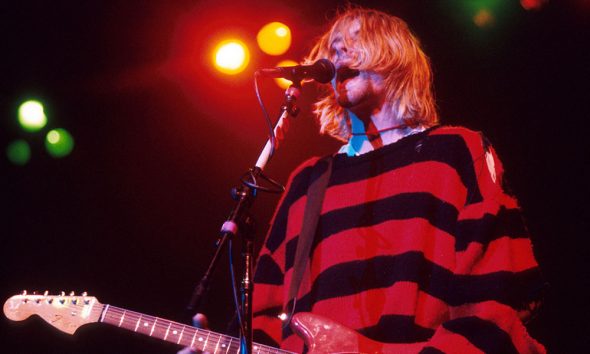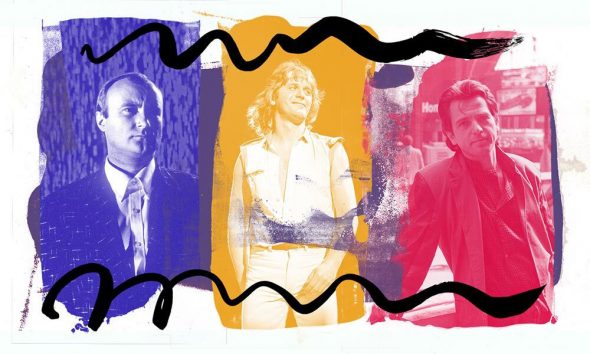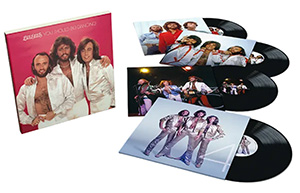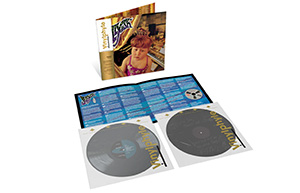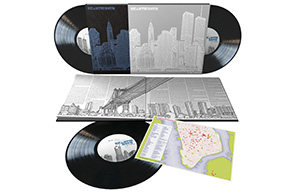The Movie Soundtracks That Made the 1990s
From ‘Pulp Fiction’ to ‘Clueless,’ it was a remarkable decade for movie soundtracks.

Bolo-tied John Travolta and black-tressed, barefoot Uma Thurman twist to Chuck Berry’s “You Never Can Tell” in Pulp Fiction’s famous dance scene. Subtly swooping synths give way to body-slamming dance beats as Underworld’s “Born Slippy” backdrops Ewan McGregor’s life-changing moment in Trainspotting’s climax. Jill Sobule’s snarky alt-rocker “Supermodel” soundtracks Brittany Murphy’s mega-makeover in Clueless.
These are just a few of the 90s movie moments burned into our brains forever by the winning combo of unforgettable imagery and the ideal tune to frame the moment. With that formula, the decade’s films found plenty of ways to make our world more fun. So, let’s look back at some of the 90s’ most era-defining, game-changing movie soundtracks and their huge impact on pop culture.
Buy the best 90s music on vinyl now.
Elfman on the Rise
The world at large first met Danny Elfman as the wild-eyed frontman for madcap L.A. New Wavers Oingo Boingo, who rocked the ‘80s with lyrical irony; a surreal, circus vibe; and hooks that could put an eye out. Eighties movies like Weird Science and Back to School wouldn’t be the same without them. But just as Devo’s Mark Mothersbaugh metamorphosed into a mighty film composer, so did Elfman make the transition from quirky rocker to respected movie maestro.
In fact, it was Mothersbaugh’s unavailability that led Tim Burton to choose newbie composer Elfman for the score of Burton’s feature film debut, Pee Wee’s Big Adventure. The two men’s artfully skewed worldviews meshed to create magic, and their partnership flourished. With their first collaboration of the ‘90s, Edward Scissorhands, Elfman hit a new musical peak. Combining the dreamy and the creepy in an elegant orchestral sweep, the score was the perfect complement to the poignant exploits of the film’s freaky but lovable hero. It helped cement Elfman’s status as a compositional icon, prompting the New York Times to compare his and Burton’s working relationship – which would continue for decades to come – to that of David Lynch and Angelo Badalamenti.
Click to load video
The Tarantino Effect
The mid 90s one-two punch of Quentin Tarantino’s Reservoir Dogs and Pulp Fiction did for their era what Martin Scorsese did for the ‘70s– altering the direction of contemporary cinema and the way it worked with music. Like Scorsese did in Mean Streets, Tarantino used popular songs from the past as commentary/contrast for the onscreen action, creating a sort of postmodern Greek chorus.
In his 1992 debut, Reservoir Dogs, Tarantino used the device of an oldies radio show as the delivery system for a big bag of ‘70s nuggets. Some were partially forgotten, like The George Baker Selection’s “Little Green Bag,” and some were evergreens like Stealer’s Wheel’s “Stuck in the Middle with You.”
Click to load video
No one could have imagined that hummable folk-rock hit as the backdrop for Michael Madsen indulging in some shockingly sadistic behavior, just as nobody would’ve foreseen John Travolta portraying the heroin-addicted hitman in Tarantino’s follow-up, Pulp Fiction. Suddenly the world was viewing both the music and the actor in a new light. And from The Statler Brothers’ 60s country-pop tune “Flowers on the Wall” to the aforementioned Chuck Berry rocker, Tarantino’s massively influential second film set up an irony/nostalgia Venn diagram for soundtrack curation that has yet to fall from favor.
Clued-In Cover Versions
Amy Heckerling’s 1995 smash Clueless might not have been the first film to feature the hottest acts of the moment redefining tunes from the past, but with its huge impact (which even extended to a TV series adaptation), it sure popularized the idea, which soon became exponentially more ubiquitous. The Muffs’ alt-rock revamp of Kim Wilde’s New Wave standard “Kids in America” blared away while audiences met Alicia Silverstone’s character and her cohorts in the film’s opening. And Counting Crows’ aching, acoustic-tinged take on The Psychedelic Furs’ “The Ghost in You” helped us all to absorb the song anew.
Click to load video
Of course, whether we’re talking about the Jill Sobule tune described earlier or contemporary cuts from the likes of Radiohead, Supergrass, and Luscious Jackson, Clueless undoubtedly helped clue plenty of ears in on those artists.
The Starmakers
While the runaway success of Clueless helped spread the gospel about some of the acts on its soundtrack, other 90s movies operated as straight-up hit-making machines. The Gin Blossoms had already exploded across America with their album New Miserable Experience well before 1995’s Empire Records hit theaters. But “Til I Hear It from You,” a piece of power-pop perfection co-written by Marshall Crenshaw, gave the band its biggest-ever hit.
Good Will Hunting, the 1997 movie that made the careers of its screenwriters/stars Matt Damon and Ben Affleck, did the same for Elliott Smith, who crooned the haunting tune “Miss Misery” heard at the film’s end. Before that, the Portland singer/songwriter had been strictly an indie cult phenomenon. After the song was nominated for an Oscar and Smith performed it live at the ‘98 awards, there was no hiding his gift any longer.
Click to load video
And the “NUXX” version of Underworld’s “Born Slippy” had already been out as the B-side of the tune’s drastically different original version in 1995, with neither one lighting the skies afire. But when the former appeared in the climactic closing of 1996’s Trainspotting, its combination of moody moments and butt-shaking beats gave the British duo the biggest success of their career.
The Mixtape Maneuver
From at least the 1960s onward, there’s been a tried-and-true approach to soundtracks that rings all the right bells no matter what era of music and film we’re talking about: the mixtape method. Cobble together a bunch of the best tracks by the hottest bands you can find, to get that feel of a friend flipping you their homemade compilation, or maybe a cool DJ laying out their playlist. Two films that bookended the decade and plugged into the youth culture zeitgeist in a major way are quintessential examples of the process. Both feature a combination of hot-off-the-presses tracks and what were originally exclusive cuts.
Click to load video
The 1990 Christian Slater star turn Pump up the Volume was perfectly positioned for this kind of route, with Slater as a rebellious high school student operating a one-man pirate radio station. His smart, cynical, sardonic character’s essence is perfectly captured in Concrete Blonde’s foreboding version of Leonard Cohen’s “Everybody Knows.” And when 1999’s American Pie helped bring the classic teen sex romp back to the fore in all its horny glory, pop-punk bangers like blink-182‘s “Mutt” and Goldfinger’s “Vintage Queen” roared out a fun reminder of what it’s like to be young, endlessly energetic, and overloaded with hormones.


